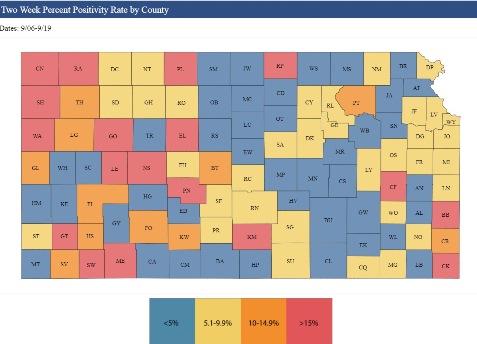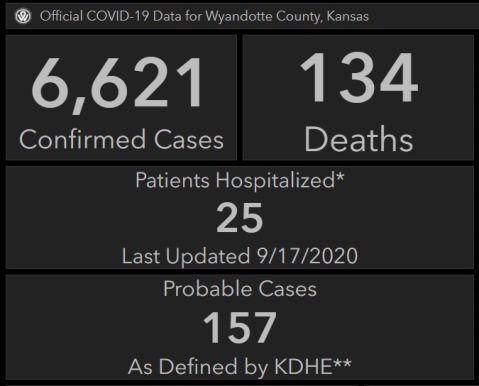

Kansas could be about two weeks away from seeing if there is another rise in COVID-19 rates from Labor Day activities and the start of school, according to a state epidemiologist.
Capt. John Rule, epidemiologist with the Kansas Department of Health and Environment, said at a news conference Tuesday morning with the University of Kansas Health System that it could be October until they are seeing any change in the case rates from the start of school.
In Kansas, cases rates had been dropping consistently since early August, he said, while in the United States, there have been two mini-waves, one in the spring and one in the summer.
In Kansas, there was a wave within the second wave starting in early August that had mostly to do with the start of school and sports, he said.
Capt. Rule said they probably won’t see huge changes in a lot of COVID-19 numbers in Kansas for another two weeks.
In some of the rural counties, the 14-day case rate is starting to be in the top tier, he said. Hays or Ellis County was third in the state as of Monday, with three to six times the number of cases per population that Wyandotte, Douglas and Johnson counties have, according to Dr. Rule.
The KDHE website coronavirus dashboard added school gating criteria about three weeks ago that includes the weekly cumulative incidence, one of the measures that is used to determine whether schools should be kept open, he said. (https://www.coronavirus.kdheks.gov/160/COVID-19-in-Kansas) Another figure often looked at is the percent positivity rate. Those measures are updated every Wednesday.
Two weeks ago, Wyandotte County’s case rate per 100,000 was dropping, and was at 112, he said. Last week the rate increased to 128 per 100,000, he said. The number of new cases reported last week in Wyandotte County was 212, according to the metric.
Similarly, two weeks ago Johnson County had a decreasing trend, 103 cases per 100,000, he said. Last week it increased to 109 per 100,000. Last week, Johnson County had 660 new cases, according to the metric.
When schools were deciding what to do in mid-August, many of the districts were telling the state that they were going to start school in person, according to Capt. Rule. Locally, the Kansas City, Kansas, Public Schools started with the first nine weeks of remote learning, while some other nearby districts used a hybrid formula of part in-person and part remote.
As each week has gone by, the percentage of hybrid or remote learning has gone up little by little in the state, he said. All decisions are made by the local school boards, based on the metrics.
Capt. Rule said the trend in October and November, unfortunately, will probably see more and more schools that are making the hard decisions to go to remote or hybrid learning.
There have been shifts in the hotspots in Kansas, starting in Johnson and Wyandotte counties, then moving to other areas, such as counties with meatpacking plants, and later to other areas, such as Wichita. Recently there have been clusters centered around universities, schools and child sporting events, he said.
COVID-19 now is shifting to the younger population, he said, but they still have nursing homes that are hotspots, also. The nursing homes now have been mandated by the federal government to be regularly tested, he added. A single case in a nursing home is treated like an outbreak, with testing following.
“We still have new individuals, like the young, but the elder or long-term care facilities, is something we pursue,” he said.
Dr. Dana Hawkinson, director of infection prevention and control at the University of Kansas Health Center, reported 24 patients at the KU Health System on Tuesday morning, up from 15 on Monday morning. He said there were seven patients in the intensive care unit, an increase from four on Monday, and three on ventilators, the same as Monday. Twenty-four other COVID-19 patients were at the hospital but were no longer classified as acute patients, a decrease from 28 on Monday.
Hays Med reported 14 cases.
The seven-day average of COVID-19 cases in the metropolitan Kansas City area was about 300, up from about 250 a few weeks ago.
The Wyandotte County COVID-19 webpage reported an additional 32 COVID-19 cases on Tuesday afternoon, with a cumulative total of 6,621. There was one additional death, with a cumulative total of 134.
Free testing continues Wednesday
Free pop-up COVID-19 testing continues from 11 a.m. to 2 p.m. Wednesday, Sept. 23, at Judson Baptist Church, 8300 State Ave., Kansas City, Kansas.
The free pop-up testing is through the Wyandotte County Health Equity Task Force and Vibrant Health.
Free testing also will be open from 9 a.m. to 3 p.m. Monday through Friday at the Health Department parking lot, 619 Ann Ave., Kansas City, Kansas. People should bring an item such as a piece of mail or a work badge to show they live or work in Wyandotte County.
The pop-up tests and the Health Department tests now are open to asymptomatic people as well as those who have symptoms or have been exposed to COVID-19.
More information about testing is at https://wyandotte-county-covid-19-hub-unifiedgov.hub.arcgis.com/pages/what-to-do-if-you-think-you-have-covid-19, or call 311.
The KU doctors’ news conference is at https://www.facebook.com/kuhospital/videos/660945301491764
The UG COVID-19 webpage is at https://alpha.wycokck.org/Coronavirus-COVID-19-Information.
The Unified Government COVID-19 hub outbreak map at https://wyandotte-county-covid-19-hub-unifiedgov.hub.arcgis.com/.
To see an NEA list of schools that have had COVID-19 cases, visit https://app.smartsheet.com/b/publish?EQBCT=aa3f2ede7cb2415db943fdaf45866d2f.
The KC Region COVID-19 Hub dashboard is at https://marc2.org/covidhub/.
The Unified Government Health Department is collecting input on people’s experiences getting tested for COVID-19 in Wyandotte County. The survey is on the UG website at https://us.openforms.com/Form/ea97a450-3d74-4d86-8d1f-6e340d55cf7c.
The UG Health Department new school and sports guidance is online at https://alpha.wycokck.org/files/assets/public/health/documents/covid/09042020fallsportsrecommendations.pdf.
A previous UG sports order is online at https://alpha.wycokck.org/files/assets/public/health/documents/covid/08132020localhealthofficerorderregardingsports.pdf.
The Wyandotte County school start order is online at https://alpha.wycokck.org/Coronavirus-COVID-19-Information.
Wyandotte County is under a mandatory mask order and is in Phase 3 of the state’s reopening plan. For more information, residents may visit the UG COVID-19 website at https://alpha.wycokck.org/Coronavirus-COVID-19-Information or call 311 for more information.
The KDHE’s COVID-19 webpage is at https://www.coronavirus.kdheks.gov/.
The CDC’s COVID-19 webpage is at https://www.cdc.gov/coronavirus/2019-nCoV/index.html.
